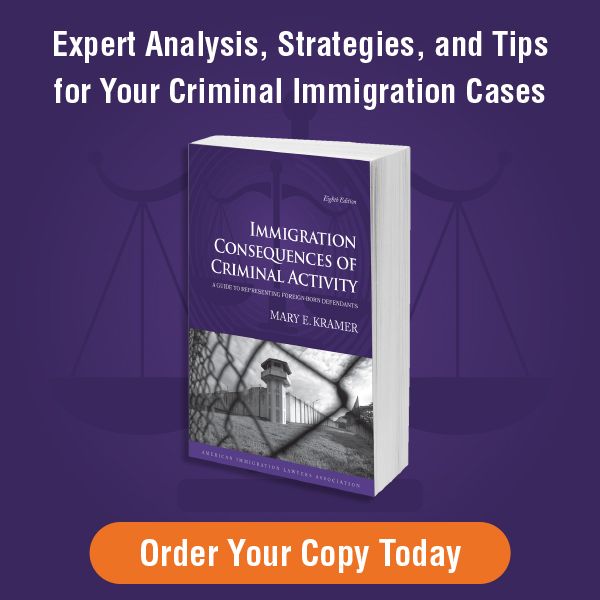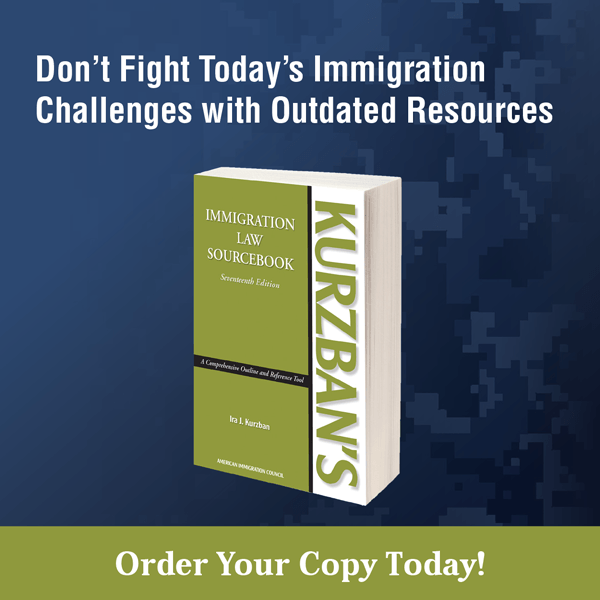Welcome to the 2020 AILA Crimes and Immigration Virtual Conference!
All registrants will receive the conference recording. All times listed are Eastern Standard Time.
 Agenda Thursday, December 3, 2020
Agenda Thursday, December 3, 2020
9:55 am-10:00 am ET Welcome and Greetings

Mary E. Kramer, AILA Author, Immigration Consequences of Criminal Activity: A Guide to Representing Foreign-Born Defendants, 8th Ed., Conference Program Chair, Miami, FL
Session Link: https://zoom.us/j/98922266515
10:00 am-11:00 am ET In-depth View of Common Crimes: What‘s New and What’s Happening?
The panelists will cover recent case law developments, honing in on the analysis for both aggravated felony and moral turpitude classifications.
Controlled Substance Update: The Board of Immigration Appeals (BIA) Versus the U.S. Circuit Courts of Appeals
- Mis-Matched Controlled Substance Schedules
- Sale vs. Distribution Elements
Crimes of Violence: Identifying the Elements
- Sentencing Enhancements: Are They Elements?
- Violence Using a Weapon
- Levels of Intent, Negligence vs. Recklessness vs. Specific Intent
Prostitution Grounds in the Era of Victim-Trafficking
- Customers, Pimps, and Victims
Theft: Different State, Different Rule
- Intent to Deprive Elements
- Retroactivity of Matter of Obeya, Diaz-Lizzaraga
Faculty:
- Mary E. Kramer (DL), AILA Author, Immigration Consequences of Criminal Activity: A Guide to Representing Foreign-Born Defendants, 8th Ed., Conference Program Chair, Miami, FL
- Jeremy L. McKinney, AILA 1st Vice President, Greensboro, NC
- W. Michael Sharma-Crawford, Kansas City, MO
Session Link: https://zoom.us/j/98922266515
11:00 am-11:20 am ET Virtual Networking Break
11:20 am-12:20 pm ET Winning Motions To Terminate And Dismiss Charges
Some removal grounds employ both a categorical and circumstance-specific approach to crime. The categorical approach can be exciting and is usually on your side, so rely on it to restrict Shepard documents (and beyond) from coming into the record.
Fraud and Deceit Crimes Under INA §101(a)(43)(M)
- Categorical on Fraud/Deceit Elements, Circumstance-Specific on Extent of Loss
- Beauty Is in the Eye of the Circuit: Intent to Deceive vs. Intent to Harm/Injure
- Move to Terminate by Establishing Immateriality or No Misrepresentation
Failure to Appear and Matter of Garza-Olivares
- Categorical as to Elements of Failure to Appear Before a Court
- Circumstance-Specific as to Court Order, Felony Charge, and Possible Sentence
Domestic Violence: Categorical or Circumstance-Specific? When the BIA Pushes, the Defense Strikes Back
- Categorical on Element of Violent Physical Force: Crime of Violence Under 18 USC §16(A)
- Circumstance-Specific as to Relationship with Victim. Why? How the BIA Gets It Wrong in Matter of H. Estrada
Violation of Protective Orders, Two-Prong Approach
Evolving Precedent from Almanza; The U.S. Supreme Court Takes Up Pereira v. Barr and Burdens of Proof
Documents from the Record of Conviction (ROC)
- Pleas of Guilty or No Contest
- Guilty Verdicts from Trial
- Are the Presentence Report and/or Other Documents Outside the ROC Ever Admissible?
Faculty:
- Karl William Krooth (DL), Conference Program Committee, San Francisco, CA
- Thomas Edward Moseley, Newark, NJ
- Sheila Stuhlman, Minneapolis, MN
- Michael S. Vastine, Miami Gardens, FL
Session Link: https://zoom.us/j/92435043446
12:20 pm-12:50 pm ET Virtual Networking Break
12:50 pm-1:50 pm ET Help Craft Criminal Plea Deals That Don’t Cost Your Client Their Future
THE ROOM WHERE IT HAPPENED: HOW TO HELP CRAFT CRIMINAL PLEA DEALS THAT DON’T COST YOUR CLIENT THEIR FUTURE
Criminal convictions carry permanent immigration consequences. And yet, sometimes, a few seemingly minor tweaks can avoid or reduce future harm. We often wish we could go back into that room where our clients unknowingly sealed their fate, so we could have steered them away from catastrophe. The panelists will focus on how you can work with criminal defense counsel to craft plea agreements that keep your client safe.
- Safely Avoiding a Conviction, Including Admissions
- Finding Safe Harbor: Researching Case Law Defining the Minimum Conduct, Definitions of the Elements, Reviewing Controlled Substance Schedules, Sentence Enhancers or Modifiers
- Definitions of Fraud, Deceit, Mens Rea, Victim’s Age, etc.
- Sanitizing the Factual Record: Removing Derogatory Facts or Dates from Charging Documents and the Plea Colloquy
- Being Aware of Limitations: The Victim’s Motivation and Involvement, Client’s Statements, Physical Evidence, etc.
- Setting Realistic Goals: Avoiding Detention and Removal, Preserving Eligibility for Naturalization, Cancellation of Removal, DACA, etc.
Faculty:
- Benjamin Crouse (DL), Conference Program Committee, Milwaukee, WI
- John Gihon, AILA Central Florida Chapter Chair, Orlando, FL
- Maria E. Andrade, Boise, ID
- Mark A. Davis, Pasadena, CA
Session Link: https://zoom.us/j/96342959598
1:50 pm-2:20 pm ET Virtual Networking Break
2:20 pm-3:20 pm ET How Crimes Affect Employment-based Cases
The Businessperson With The Hidden Past: How Crimes Affect Employment-based Cases
Employers, employees, students, and holders of nonimmigrant visas are not immune to criminal activity, though most do not like to talk about these issues. For the employment-based immigration lawyer, dealing with criminal activity and the consequences of criminal convictions is generally not an everyday experience. Using real life scenarios, this panel of experts will discuss a multitude of crimes in the context of employment-based cases and offer analysis, suggestions, and tips on how to deal with the effects of criminal charges and convictions on employment-based cases.
- What Were You Thinking? Common Crimes That Render the Business Client Inadmissible and/or Removable
- How Can I Help You? How to Analyze Crimes and Criminal Activity in Adjustment of Status Cases
- Will They Let You In? How to Analyze Crimes and Criminal Activity in Consular Processing Cases
- Do You Have a Medical Problem? How to Deal with Panel Physicians and Consular Officers When the Client Has a Criminal History
- Will You Get the Visa? How Do Criminal Convictions or Charges Impact Nonimmigrant Visas?
- Why Did You Do That? What to Do When the Client Is in Trouble, How to Deal with a Difficult Case
Faculty:
- Anthony Drago Jr. (DL), Conference Program Committee, Boston, MA
- Cheryl David, AILA Removal Defense Section Steering Committee Chair, New York, NY
- Daniel J. Parisi, London, UK
- Amy L. Peck, Omaha, NE
Session Link: https://zoom.us/j/98553898898
3:20 pm-3:40 pm ET Virtual Networking Break
3:40 pm-4:40 pm ET Custody, Bond, and Habeas Corpus Petitions
CUSTODY, BOND, AND HABEAS CORPUS PETITIONS: WHERE ARE WE NOW?
Challenging detention has become complex. Respondents have faced increasing detention periods, dangerous conditions, and inability to access release despite rapidly changing circumstances. Learn how to persist in getting your clients out of detention, including using the most cutting-edge arguments from other jurisdictions.
- Joseph Hearings: Best Practices in Arguing Against Mandatory Detention and Negotiating with ICE
- Matter of Egidijus Siniauskas: DUI and Dangerousness, Impact on Good Moral Character
- Changed Circumstances: Arguments for a New Bond Hearing
- Developments in Burdens of Proof and Ability-to-Pay Bond
- Navigating Respondent and DHS Appeals with the BIA
- Staying on Top of, and Continuing to Argue, Prolonged Detention, COVID-19, Indefinite Detention, and Habeas Theories
Faculty:
- Sui Chung (DL), AILA EOIR-ICE Joint Committee Chair/Removal Defense Section Steering Committee, Conference Program Vice Chair, Miami, FL
- Kerry E. Doyle, AILA Removal Defense Section Steering Committee, Boston, MA
- Elizabeth Jordan, Denver, CO
- Zachary Nightingale, San Francisco, CA
Session Link: https://zoom.us/j/94154766957
4:40 pm-5:00 pm ET Virtual Networking Break
5:00 pm-6:00 pm ET Using Modern Concepts To Establish Eligibility For Relief
GETTING INTO THE GAME: USING MODERN CONCEPTS TO ESTABLISH ELIGIBILITY FOR RELIEF
In the context of relief from removal and immigration benefits, advocates must “win on the law” before their clients can “win on the facts.” 2020 presents a dynamic landscape of questions impacting legal eligibility, including the burden of proof and the assessment of crimes. These questions turn on the courts’ and agencies’ reading and interpretation of the immigration statute. The expert panelists will address recent recurring and novel issues for using current standards to the fullest extent possible, to the benefit of clients seeking to establish eligibility for immigration benefits or relief from removal.
- Barton v. Barr, Hypothetical Travel and the Stop-Time Rule, New Eligibility for Post-Conviction Relief
- Remembering and Reviewing INA §212(h): Free-Standing, Aggravated Felony After Adjustment of Status
- DUIs and Rebutting a Lack of Good Moral Character: Arguing Statutory and Discretionary Eligibility
- U Visas in Removal Proceedings, Navigating Immigration Judge Jurisdiction in Waivers, Maintaining Arguments Under Sanchez-Sosa Against Recent BIA Decisions
- Considerations and Strategies in Representing I-130 Beneficiaries and Applicants for Humanitarian Relief Who Are Subject to Mandatory Detention
- Misapplication of the Particularly Serious Crime Bar
Faculty:
- Erich C. Straub (DL), Milwaukee, WI
- Kelli Jo Stump, AILA Treasurer, Oklahoma City, OK
- James R. Fujimoto, Chicago, IL
- Francisco “Frank” Symphorien-Saavedra, Orlando, FL
Session Link: https://zoom.us/j/98899857869
Thank You to All the Volunteers Who Make the Crimes and Immigration Virtual Conference Possible!
Conference Program Committee
- Mary E. Kramer, AILA Author, Immigration Consequences of Criminal Activity: A Guide to Representing Foreign-Born Defendants, 8th Ed., Conference Program Chair, Miami, FL
- Sui Chung, AILA EOIR-ICE Joint Committee Chair/Removal Defense Section Steering Committee, Conference Program Vice Chair, Miami, FL
- Benjamin Crouse, Conference Program Committee, Milwaukee, WI
- Anthony Drago Jr., Conference Program Committee, Boston, MA
- Karl William Krooth, Conference Program Committee, San Francisco, CA




